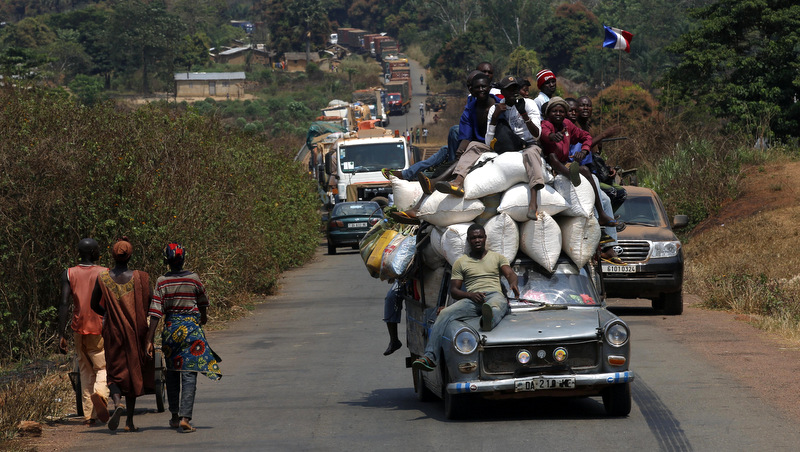
Insecurity created by the Islamist militant group Boko Haram, which operates mostly in northern Nigeria, is having an impact across a wide swathe of countries in the region, according to reports.
A spate of recent arms seizures and arrests of traffickers in Cameroon destined for neighboring Nigeria is reflecting the increasing instability being created by Boko Haram, a report by IRIN News on Friday has revealed. The article also stated that the situation could be impacting events in the Central African Republic (CAR) and Sudan.
Cameroon’s military forces detained a man attempting to transport 655 guns to Nigeria in January, IRIN reported, and 5,400 AK-47 rifles were seized on a pickup truck in Maroua, the capital of Cameroon’s Far North Region, in September.
Officials said the weapons are emanating from Sudan and CAR. Cameroon’s northern territory is a sliver of land also known as the Extreme North Region, which borders Chad to the east and Nigeria to the west.
“Many firearms have been seized from traffickers in the region in recent days, coming from crisis countries like Sudan and CAR,” a police officer from the regional capital, Maroua, told IRIN. “The number could be higher due to the disarmament taking place in CAR. This region remains a zone for traffickers because it is closer to Nigeria.”
Banditry is also a huge problem in the area, lending to the ease with which traffickers are able to navigate the area and avoid state security forces. The nature of the remote area, which is considered a porous border region, makes the situation that much more difficult to control. It makes for a complicated area that is difficult for officials with limited resources to monitor.
“The development of armed highway banditry, otherwise commonly known as the coupeurs de route phenomenon in the Northern region of Cameroon is a classic case of such a combination,” a report by the Bonn International Center for Conversion said. “This is largely a fallout of years of internecine conflict in Chad, political instability and low intensity armed conflicts in the Central African Republic, ethnic and political violence in both the Northern region of Cameroon and Northern Nigeria, and the general political and civil turmoil in the West and Central Africa regions.”
As Nigerian military forces step up their efforts to crush Boko Haram, the militant group is simply criss-crossing bordering countries to escape authorities. Niger and Cameroon have been specific hiding spots for the group, but they are not running around with total impunity. Nigerien officials reported on Feb. 17 that they had captured 20 members of Boko Haram inside their border but plotting an attack on inside neighboring Nigeria, according to Reuters.
The clampdown by Nigerian security forces has had an adverse effect, sending many civilians fleeing into neighboring Cameroon for safety.
“Before the deployment of the special security forces of the Rapid Intervention Unit in 2009 to the Far North of Cameroon, the region was highly plagued by highway robbers armed with light machine guns,” a gendarme official with the intelligence division told IRIN. “But today, armed robbery has (been) reduced in the Far North, giving way to arms traffickers now targeting new markets in neighbouring Nigeria. Because of the vast nature of the region’s borders, traffickers sometimes can pass through the region without being detected.”
Meanwhile, refugees from CAR, Chad, Nigeria and Sudan have challenged the Cameroonian government’s ability to sufficiently tackle the arms trafficking problem, IRIN reported.
“Cameroon currently hosts over 100,000 people,” according to the the UN’s refugee agency, UNHCR. “The country has always kept its borders open to asylum-seekers, and is signatory to all major international and regional legal instruments on refugees.”
UNHCR goes on to state in a separate recent report, “Recent clashes between the Nigerian Army and (Boko Haram) in the north-east of the country have led over 4,000 people to seek refuge in Cameroon since mid-January, while an estimated 1,500 people have fled to Niger.”
Cameroon’s openness to taking in refugees may be part of its problem, as IRIN notes, “officials fear refugee camps may conceal militants” involved in attacks or smuggling in the area. Also, “Observers point out that the Boko Haram insurgency in northeastern Nigeria is a major factor driving the arms smuggling.”
Unrest in CAR, the Democratic Republic of Congo (DRC), Sudan, South Sudan and elsewhere is having a significant impact on how Boko Haram is able to obtain their weapons, according to a Cameroon-based expert.
“The present regime in CAR is yet to evaluate and recover millions of arms reported to have been looted from government armouries,” David Mekong, a political analyst based in Cameroon’s capital, Yaoundé, told IRIN. “Where do these arms go to after the war? The Boko Haram war is heightening, explaining the high trafficking of arms through Cameroon’s Far North, which links Nigeria with other crisis zones such CAR, Sudan, Libya and DRC.”
“After wars, firearms are sold at relatively low prices, a real business opportunity for traffickers. As disarmament and demobilization is taking place in CAR, arms from the conflict can easily reach Boko Haram and others crisis zones,” he continued.
That means Nigeria’s military might have their work cut out for them. The governor of Nigeria’s Borno State recently said he was outgunned after two attacks by Boko Haram left dozens dead. Nigerian government officials denied this.
If Boko Haram is able to secure more arms, it will surely lead to greater insecurity in the region.

